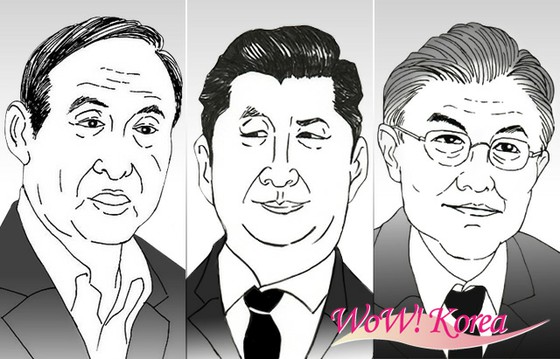 |
From the beginning, South Korean political leaders have been frightened and maintained a weak attitude of "strategic ambiguity" between China and the United States. If you think you can maintain close ties with China and at the same time protect South Korea's independence, it's a "dangerous gamble." South Korea's barely won freedom and independence are now being sold by pro-Chinese politicians, pro-Chinese business elites, and pro-Chinese opinion makers.
They do not value freedom and independence, but only consider their own wealth, political power, and social influence. Koreans should decide how important "independence" is as a sovereign state.
If the answer is "not so much", you can keep your head down and continue getting Chinese money. On the other hand, if it is "terrible," South Korea must endure the economic punishment imposed by China and at the same time pay the price for freedom.
Koreans are insensitive to criminal acts such as the crackdown on human rights in Uyghurs, China today, but are very sensitive to past war crimes that are more than 70 years old. It's amazing. However, the fact is that Japan is an ally of South Korean that could restrain China's ambitions to control Northeast Asia.
The Chinese Communist Party is actively working to intensify anti-Japan sentiment within South Korea. Some anti-Japan nationalist groups in South Korea are under the control of the Chinese Communist Party.
The title of this interview article is "Frightened by China, weak Korean politicians...can we protect the independence that we barely won?" However, on the same date in the Chosun Ilbo, an article titled "US, EU, UK, Japan and NATO criticize China's cyber attacks...South Korea does not join" a strange ensemble was produced.
Professor Hamilton's book, which accused China of its omnidirectional penetration strategy for Australia, was published in 2018 and was evaluated as having struck the essence of the Chinese Communist Party.
Korean Enlightenment bureaucrat Kim Hong-jip (1842–1896) visited Japan in August 1880 and was shocked to see it modernized. Then, when he returned to Japan a month later, received a book called "Korean Strategy" from the Qing dynasty diplomat "Huang Zunxian (1848-1905)" stationed in Japan.
At that time, the book contained Huang Zunxian's idea that Korea, Japan, and the Qing dynasty should cooperate closely with each other in order to counter "Russia," who were pushing southward. As an indication to Korea, it comes out as follows.
"People from all nations of the world are looking at Korea in a dangerous way, and only Koreans are unaware of the imminent disaster."
The next one mentioned was "Tsubame-dokoro-do". "a caged bird in a pavilion (idiom)" to lose vigilance by comfortable living unaware of the disasters ahead). The 'caged birds' naturally points to Korea. Huang Zunxian advised on a strategy that Korea deserves to use.
"Pro-China, United Japan, United States of America"
He said to make an effort to strengthen the country. Get along with China, unity with Japan and solidarity with the United States. After returning to Japan, Kim Hong-jip presented "Korean Strategy" to Gojong (the King of Korea at that time). Gojong was interested in the content and circulated it around his bureaucrats and other major figures.
However, the politicians and intellectuals of Korea at that time could not read the flow of change of the times. Rather, the movement of the Confucian sect (preserving Confucian justice and excluding the evil Western and Japanese influences) against the contents of the book became even stronger, and on March 25th, 1881, Reinan Confucian etc (group proposal / reporting to the emperor)" had been accepted.
In the text of the Manninsho, "When I saw the book called Kim Hong-jip's Korean Strategy, I was naturally sick and tired, and I couldn't help but cry. I don't get it."
In February 1896, Gojong's internal exile (the case where the King of Korea moved to the Russian embassy after the assassination of the queen by a Japanese wanderer) was Kim Hong-jip (then Prime Minister) and Yoo Gil-jun. (Yu Kil-chun, Korea's first Japanese-American international student), Jung Byung-ha (Chung Qin Xia), Cho Hee-young (Zhao Feng), Chang Bak (Zhang Hiroshi), etc. rice field.
Thousands of merchants mobilized by the pro-Russian government Gojong had gathered to execute Kim Hong-jip, and the Japanese army escorted Kim Hong-jip. Yu Kil-chun, Zhang Bo-buchi, and Zhang Hiro are on the way to exile in Japan, but Kim Hong-jip and Zhang Bo Xia shake off the Japanese troops' detention, went out to the streets, got caught, and died a miserable on the street of Gwanghwamun.
According to the records of the Japanese legation at that time, this was the end of Kim Hong-jip.
"I wasn't tired of the crowd stabbing Kim Hong-jip, so I tied a rope to the body's leg, dragged it around in Jongno, and after being written as" a great rebellion and immoral sinner, "he wrestled with a club again. Then I stepped on it with my foot and struck it with a stone, so I couldn't tell what it was. "
It also appears in Hwang Hyeon (Hwang Hyeon, Korean poet, 1855-1910)'s "Umezumino Roku".
"The Korean officials pulled Prime Minister Kim Hong-jip to the front of the police office. As soon as they saw an angry crowd gathering and there was no room for a sword, they retreated and then swords. As soon as Kim Hong-jip collapsed, several police officers jumped in with their swords and cut their chests and backs all at once. I tied the part with a rough rope, routed it to the sword, and stuck a piece of paper with the words "Great rebellion and immoral Kim Hong-jip". Then the road-filled merchants threw a large stone at the body and stepped on it, leaving the body unharmed. "
Kim Hong-jip's wife (Namyang Hong) killed her son and committed suicide.
Gojong, who received the book "Korean Strategy" that he should be wary of "Russia" going south, ironically entrusted himself to "Russia" and executed the Enlightenment bureaucrats, and eventually went on the path of exile. I walked.
Korea traced the official of the exiled country (incompetence of the leader + undeveloped people) as it is. The incompetence of the leader leads to cowardice, and the undevelopedness of the people leads to brutality. Gojong's Internal Excursion is a cowardly case of incompetence, and the wrongdoing of the crowd against Enlightenment bureaucrats is a case of brutality caused by undeveloped.
Today, an Australian intellectual has published a book that warns China as it moves south. However, it seems that the situation in South Korea today has not changed significantly compared to the time of the "Korean Strategy" 140 years ago.
The leaders are incompetent, and the people are so low that they are the only ones in the world to be at the mercy of "mad cow disease incitement." It has the official framework of the exiled country (incompetence of leaders + undeveloped people). The only difference is that 140 years ago the subject of caution was "Russia", but now it has been replaced by "China".
History is said to repeat itself. If the case 140 years ago is reproduced as it is, it can be easily summarized like this.
"Leaders have become totally dependent on China, and the lack of knowledge and education will dismiss the United States and Japan from the free democratic camp and go on the path of exile."
Already, such signs are certain. The leader publicly declared that he would share the "Chinese Dream." The public is also responding that such leaders are good, with a support rating of 50%, despite any mismanagement. In addition, for a long time, Japan, which is a free camp, has not been afflicted and has caused mass hysteria.
The official of the exiled country (incompetence of the leader + undeveloped people) remains the same. If this situation continues without improvement, one day, the nation that was in the 10th place in GDP may have died, and as a rare case, "Korea" may be overwhelmed all over the world. ..
* This article is a Japanese translation of a contribution by Mr. LUDA, a conservative Korean conservative fund. The Korean version has already been published in the Korean media. We are responsible for the accuracy of the translation.
* * "Silent Invasion: China's influence in Australia" is published in Japan under the title of "Invisible Invasion of China's Australian Control Plan".
2021/07/28 20:48 KST


